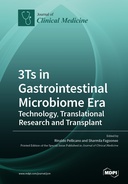Explore

3Ts in Gastrointestinal Microbiome Era: Technology, Translational Research and Transplant
0 Ungluers have
Faved this Work
Login to Fave
We have entered a new era where some concepts of the complex community of microorganisms (microbiota comprising bacteria, fungi, viruses, bacteriophages and helminths) are being re-discovered and re-visited. Microbiota and human interaction is not new; they have shared a long history of co-existence. Nevertheless, the opportunities to understand the role of these microorganisms in human diseases and to design a potential treatment were limited. At present, thanks to development of innovative and cutting-edge molecular biological and microbiological technologies as well as clinical informatics and bioinformatics skills, microbiome application is moving into clinics. Approaches to therapy based on prebiotics, probiotics and lately on fecal microbiota transplantation has revolutionized medicine. Microbiota outnumbers our genes and is now regarded as another organ of the body. The gastrointestinal tract and gut microbiota display a well-documented symbiotic relationship. Disruption of intestinal microbiota homeostasis—called dysbiosis—has been associated with several diseases. Whether dysbiosis is a cause or consequence of disease initiation and progression still needs to be investigated in more depth. The aim of this book is to highlight recent advances in the field of microbiome research, which are now shaping medicine, and current approaches to microbiome-oriented therapy for gastrointestinal diseases. Dr. Rinaldo Pellicano Dr. Sharmila Fagoonee Guest Editors
This book is included in DOAB.
Why read this book? Have your say.
You must be logged in to comment.
Rights Information
Are you the author or publisher of this work? If so, you can claim it as yours by registering as an Unglue.it rights holder.Downloads
This work has been downloaded 109 times via unglue.it ebook links.
- 109 - pdf (CC BY) at Unglue.it.
Keywords
- acute pancreatitis
- Alzheimer’s disease
- auto-immunity
- Bacteroides ovatus
- Bifidobacterium adolescentis
- celiac disease
- chronic pancreatitis
- cirrhosis
- Clostridium difficile
- Crohn’s disease
- Culture
- culturing of fecal microbiota
- Diabetes Mellitus
- dysbiosis
- enteropathy
- Faecalibacterium prausnitzii
- fecal microbiota
- fecal microbiota transplantation
- feces donor
- Flow Cytometry
- gastric microbiota
- gastrointestinal
- gluten
- gut
- Gut Microbiota
- gut permeability
- gut virome
- Helicobacter pylori
- hepatocellular carcinoma
- high-throughput
- IBS
- IL-12p70
- IL-6
- Il-8
- infant gut
- inflammatory bowel disease
- intestinal flora
- intestinal microbiology
- intestinal permeability
- irritable bowel disease
- medicine
- Medicine: General Issues
- metabolic syndrome
- metabolomics
- microbiome
- microbiota
- microbiota–gut–brain axis
- mononuclear cells
- Necrotizing enterocolitis
- neurodegenerative disease
- next-generation sequencing
- pancreatic cystic neoplasms
- pancreatic diseases
- pancreatic ductal adenocarcinoma
- persistent
- precision medicine
- Public health & preventive medicine
- Ruminococcus gnavus
- Sequencing
- steatosis
- Technology
- Therapy
- transient
- transient receptor potential channel
- Type 1 Diabetes
- ulcerative colitis
- viability of bacteria
- zonulin
Links
DOI: 10.3390/books978-3-0365-2797-0Editions

